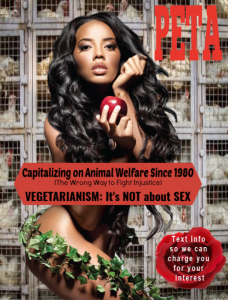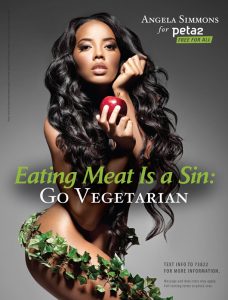PETA: Selling Sex, Reifying/Reproducing Stereotypes, and Capitalizing on Animal Welfare
The Original Peta Advertisement
In 2011, PETA enlisted celebrity figure, Angela Simmons, for their “Eating Meat is a Sin” advertising campaign. Simmons is positioned in the nude as a type of new-age, biblical Eve who is clasping a red apple suggestively. PETA’s counterfactual impact on the animal rights movement has focused heavily on stratagems like “sex-sells” advocacy, in which overtly sexualized images of women are used to promote veganism or animal rights. The use of a hyper-sexualized image cheapens the debate of animal welfare, while raising red-flags about who this image is truly for and what it is really promoting. PETA’s shock-tactics have had devastating effects on the animal rights movement’s reputation, causing it to be dismissed as antagonistic or trivial compared to human rights issues. With advertising slogans ranging from “Vegetarians Taste Better” to “A Holocaust on your Plate,” PETA perpetuates these issues in an attempt to sway mass audiences, proving themselves unable to present ads that are inclusive, body-positive, and culturally/ethnically sensitive.
PETA attempts to push back against meat-eating norms and to vilify meat-eaters, however, in doing so they have reified and reproduced stereotypes of sexuality and gender. Simmons is presented in a way that suggests there is a right way to be female and a right way to be vegan, which discounts individuals’ unique perspectives based on how they are situated in the world. Additionally, PETA is known for its fat-phobic promotion of vegetarianism to achieve Eurocentric beauty standards, which can be damaging for women who do not meet these stringent standards. The image concurrently reminds viewers of a painful history. When Eve is persuaded to eat the forbidden fruit, she is cursed to live in perpetual subservience to her husband. Men have used this biblical story over the course of history as a justification for the lack of female rights within society and for men’s control over the female body. PETA’s appropriation of this story perpetuates long-held stereotypes about women, which have functioned to prescribe women’s lives throughout history. With the use of a hyper-sexualized body and Christian tropes, it is clear that this ad fails to serve oppressed groups, including women, people of colour, people of different ethnicities, and LGBTQ2+ individuals.
PETA is no longer an entity that cares about animal welfare, because it has become a self-serving enterprise that seeks to capitalize on animal welfare. PETA’s promotion of vegan products demonstrates how veganism has been assimilated into capitalism’s economic exploitation. PETA promotes a “universal vegan” replete with the benefits of economic status, geographic location, and cultural traditions typical for a white, middle-class community. The image first appeared on PETA’s website, which is filled with “cruelty-free” recipes for the newly recruited. These highly processed items detract from veganism’s potential to work outside systems of inequality and oppression such as capitalism and gentrification. PETA contributes to the stereotype that veganism is for privileged, high income individuals, when in reality, there have always been low-cost, plant-based options. Beneath a guise of compassion for animals, PETA appears to be much more interested in making themselves money, regardless of who is shamed or left out in the process.

My Jamming Philosophy
In my jammed version of PETA’s advertisement, I wanted to emphasize the absurdity of the original ad and its obvious failure in promoting animal rights and vegetarianism. In the jammed photo, I replaced the background with an image from a factory farm in order to draw attention to the real goals of the animal rights movement. By relying primarily on sex-sells advocacy, the factors that draw people from various social locations into the animal rights movement—the same factors that challenge conventional thinking about the treatment of animals and its impact on our planet—are hidden behind a “sexy,” glossy advertisement. The original ad does nothing to direct you to the inherent cruelty and capitalist greed within the industrial factory farming complex, nor does it draw attention to the ways in which these practices harm both our planet and our health as humans. The future of the animal rights movement has the potential to be inclusive, culturally diverse, and inviting, but it needs PETA to put an end to their individual-focused strategies, gimmicks and harmful publicity stunts.
PETA uses certain language to promote universal veganism, which often assumes a white, middle class perspective, in turn, making PETA the most damaging advocate for animal rights. To shift the reputation of veganism away from being a luxury lifestyle towards a social justice praxis, I have changed the text on the image to draw attention to how PETA has successfully capitalized on animal welfare, so much so, that I would imagine PETA desires that things remain the same so they can continue to profit off injustice. I have also added additional text that reads “Vegetarianism: its NOT about SEX,” in order to clarify that the animal rights movement has nothing to do with the sex, or beauty standards, and everything to do with liberation from oppression and capitalist exploitation. Human rights must be considered an essential part of animal activism, therefore, it is paramount to move away from mainstream tactics that are prone to species-specific/single-issue campaigns (Wrenn & Johnson, 2013). From within the movement, animal activists have the potential to bring attention to privilege in the vegan community, with the intent to encourage others to engage in intersectional advocacy (McJetters, 2015). Vegetarianism/veganism through an intersectional approach, has the potential to serve as an expressway toward food justice and work outside of the normative systems of domination. Hopefully, by recognizing how PETA’s tactics and frameworks are damaging and contribute to oppression, activists can establish new, revolutionary frameworks in order to diversify the movement—if it is applied with the appropriate consideration of the struggles of marginalized populations (Greenebaum, 2017).
Intersectionality is an essential component to any successful activism, therefore, social justice movements like animal rights, which use Eurocentric tactics to fights Eurocentric systems, cannot create effective liberation movements because their strategies remain oppressive and unilinear. These mainstream tactics employed by PETA (Christian tropes, sex advocacy) are ineffective at reaching the larger population. In their promotion of universal veganism, PETA follows mainstream (hegemonic) feminism in prioritizing the comfort and conscience of the most privileged in the movement, while ignoring the marginalized. Social justice movements like animals rights, must focus on inclusivity and diversity if there is any hope in bringing the movement mainstream.
Sources:
Image: https://www.peta2.com/news/angela-simmons-go-vegetarian-ad/
Peta Website: https://www.peta.org/.
Greenebaum, J. B. (2017). Questioning the Concept of Vegan Privilege: A Commentary. Humanity & Society, 41(3), 355–372. https://doi.org/10.1177/0160597616640308
McJetters, C. (2015). Appropriation and Animal Rights: The Intersectional Activist. Accessed June 10 2019, https://strivingwithsystems.com/2015/04/06/appropriation-and-animal-rights-theintersectional-activist/)
Wrenn, C. L., & Johnson, R. (2013). A Critique of Single-issue Campaigning and the Importance of Comprehensive Abolitionist Vegan Advocacy. Food, Culture and Society: An International Journal of MultidisciplinaryResearch, 16(4), 651-668. doi:10.2752/175174413×13758634982092
